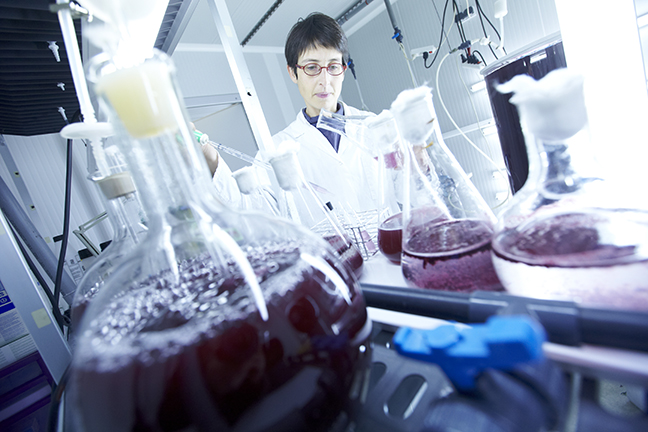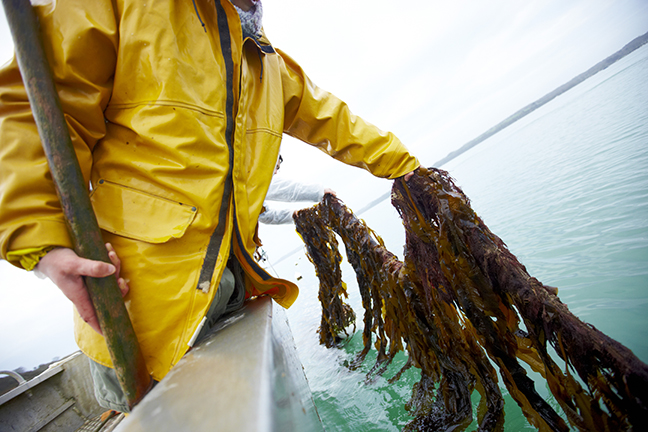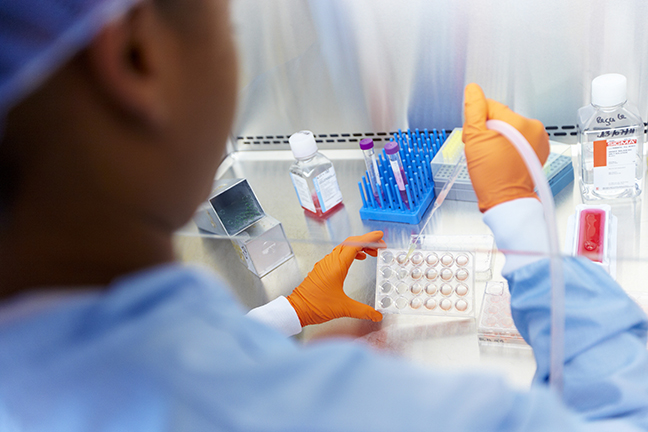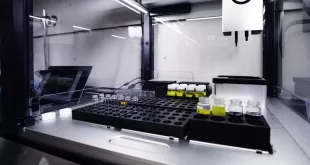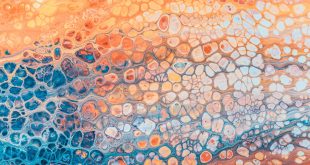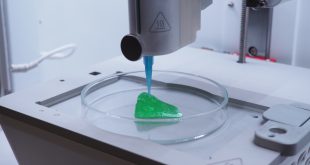By Hermione Wilson
Brittany is the home of blue biotech in France. It is the country’s number one agricultural region, a major producer of fresh produce and ornamental plants, and a leading industrial region for biotechnology. A cultural region in France, Brittany was once an independent country with strong connections to the British Isles and is now made up of four French départements (similar to British counties). A variety of algae and other microorganisms flourish on the Breton shores and it is these rich marine resources that have put the region on the biotechnological map.
Blue Biotech
The goal of the biotechnology industry in Brittany is to use the natural marine resources and then add value. The research aims of marine biotech, also known as blue biotech, includes developing sustainable methods of harvesting algae and extracting bioactives from marine sources. It’s led to innovations such as powdered algae solutions to replace chemicals in paint; biofuels and bioplastics developed from marine sources; and cosmetics enhanced with marine sugars and other marine bioactives.
“We have on our coast more than more than 700 species of algae. Brittany has 1,700 km of coastline… so that makes Brittany’s coast an unequaled source of marine [variety],” says Roland Conanec, Project Manager, CBB Capbiotek, a biotech cluster which helps companies with R&D and economic development.
CBB Capbiotek works to promote the region’s marine biotechnology and marine cosmetics industries, as well as connecting biotech companies and research centres to the financial support they need. Within the network of Capbiotek, there are 250 key stakeholders in the field of biotechnology. Of those, 150 are biotech companies and the remainder are research centres and other related organizations. CBB Capbiotek recently worked with clusters in the neighbouring Pays de la Loire region to organize Forum Blue Cluster.
The Forum Blue Cluster has become a place where blue biotech companies and research centres from Brittany meet to discuss the innovative work they’re doing, work that includes the 1 million € project Blueco PHA, that has developed a way to use marine microorganisms to produce bioplastics.
“You can feed these microorganisms byproducts of the agricultural industry and they transform these byproducts into biopolymers called PHA,” Conanec explains. “This PHA can be used in bio-plastics and they are more biodegradable, and they are less polluting.”
At the last Forum Blue Cluster in November 2015, Conanec says companies discussed tapping into marine resources to find clean energy solutions. One company, BiotechMarine, has developed a novel method of cultivating algae in its own plant rather than trying to harvest large quantities from the sea.
“That’s new because it is very difficult to cultivate algae in reactors,” Conanec says. “It’s a very long and difficult [process].” BiotechMarine’s new method also ensures the harvesting processes is sustainable and doesn’t overload the local ecosystem.
One of the biggest challenges the blue biotech industry faces in Brittany is developing a sustainable way to reproduce all the algae and other marine resources it needs. Environmental concerns mean that French legislation governing the use of marine resources is very strict.
“We have to manage our marine resources in a sustainable way,” Conanec says. “If you want to use algae, for instance, instead of chemical products, you have to be able to produce very large amounts, but you can’t produce algae… wherever you want. If you don’t cultivate the algae in the right place you will find it all over the Breton coast.”
Another big focus of the biotech industry in Brittany is cosmetics. “We have for long time worked on the use of marine ingredients, on the benefits of the sea for cosmetics, for skin [and] for wellness,” Conanec says.
Codif, a cosmetics supplier to major brands such as Estée Lauder and L’Oreal that is based in Brittany, has developed a new marine sugar that has interesting age-defying properties. Using the fermentation process, Codif was able to extract new polymers from marine microorganisms. The company plans to launch its new product at the In-Cosmetics show, a main event for the cosmetic ingredients industry in Europe. Codif is also involved in developing new ways to sustainably cultivate the algae from which it extracts its ingredients.
The local cosmetic ingredients industry has also organized its own local conference called Cosm’ing, Conanec says. It will be the first of its kind this year and many major cosmetics companies are expected to attend. The event is part scientific conference and an opportunity for businesses to meet face-to-face.
“Our aim at CBB [Capbiotek] is to help… small companies develop new ingredients to bring more value to Brittany and to develop innovations using these marine resources,” Conanec says.
International connections
Franck Zal, CEO of Hemarina, began studying the extracellular hemoglobin of marine vertebrates that allows them to survive in and out of the water and ended up discovering a blue substitute to transport oxygen in the body. Hemarina has been able to adapt this unique marine blood, which it refers to as universal marine oxygen carriers, as an additive for organ transplant preservation solutions, and a wound healing aid that can be transported in powdered form and reconstituted with water. The company has several international contracts to develop medical applications, including for the US Navy. Hemarina is currently working on a way to use the extracellular hemoglobin for human blood transfusions since it is very close to human blood and has no blood type.
Zal was instrumental in forming Capbiotek in 2007. He and members of other biotech companies in the region felt the large concentration of blue biotech industry in the Brittany region warranted its own network. According to Zal, Capbiotek focuses on the academic realm and SMEs, while another cluster he helped form, Bretagne Bioscience, specializes in the business and commercialization side of things.
The blue biotech cluster isn’t just focused on the Brittany region, however. Through involvement in the cosmetics industry and in partnerships with other countries, it is making a name on the international stage.
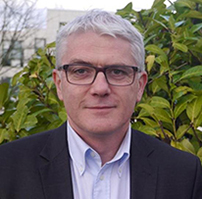
“I have been to Quebec several times to collaborate or partner with companies there,” Conanec says, without going into specific detail. He does expound on the academic partnerships that exist between institutions in both countries. For example, the University of Brest and Roscoff Marine Station, a major research centre in Brittany, have research partnerships and student exchange programs with schools in Rimouski and Montreal.
“They have large amounts of algae in the [Saint Lawrence River],” Conanec says. “We can help them develop processes to [use] algae in active ingredients” and in return Quebec can give Capbiotek and the Brittany region access to new resources.
Capbiotek and its partners are working hard to keep blue biotech innovation, and the revenue and jobs it generates, in the Brittany region. Fortunately, Conanec says, local government has been very supportive of the organization and its goals of commercializing marine resources in the region.
“The local government has a strategy to support collaboration between research and economy, and has chosen to help the biotech sector as one of the seven major sectors of the region,” Conanec says.
Aside from the financial support of local government and the natural resources of Brittany’s coastline, there are many factors that have contributed to the success of the region’s marine biotechnology sector. Zal points to an environment that fosters connections between fundamental research and innovation.
“To work closely with academic centres [like Roscoff] is very nice because… we can transfer innovation to start-up companies and so on,” he says.
Brittany Biotech Facts & Figures
700 species of algae
1,700 km of coastline
250 biotech companies, research centres and key stakeholders
60 marine biotech companies which provide 1,400
Jobs
Brittany is France’s 3rd most important biotechnology region, after Paris and Grenoble.
The cosmetics industry in Brittany, excluding thalassotherapy, is made up of more than 100 companies that provide more than 1,000 jobs.
The region is home to more than 50% of total French oceanographic research.
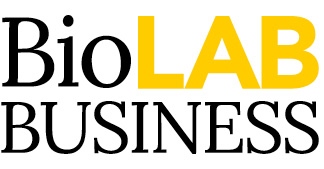 BioLab Business Magazine Together, we reach farther into the Canadian Science community
BioLab Business Magazine Together, we reach farther into the Canadian Science community
